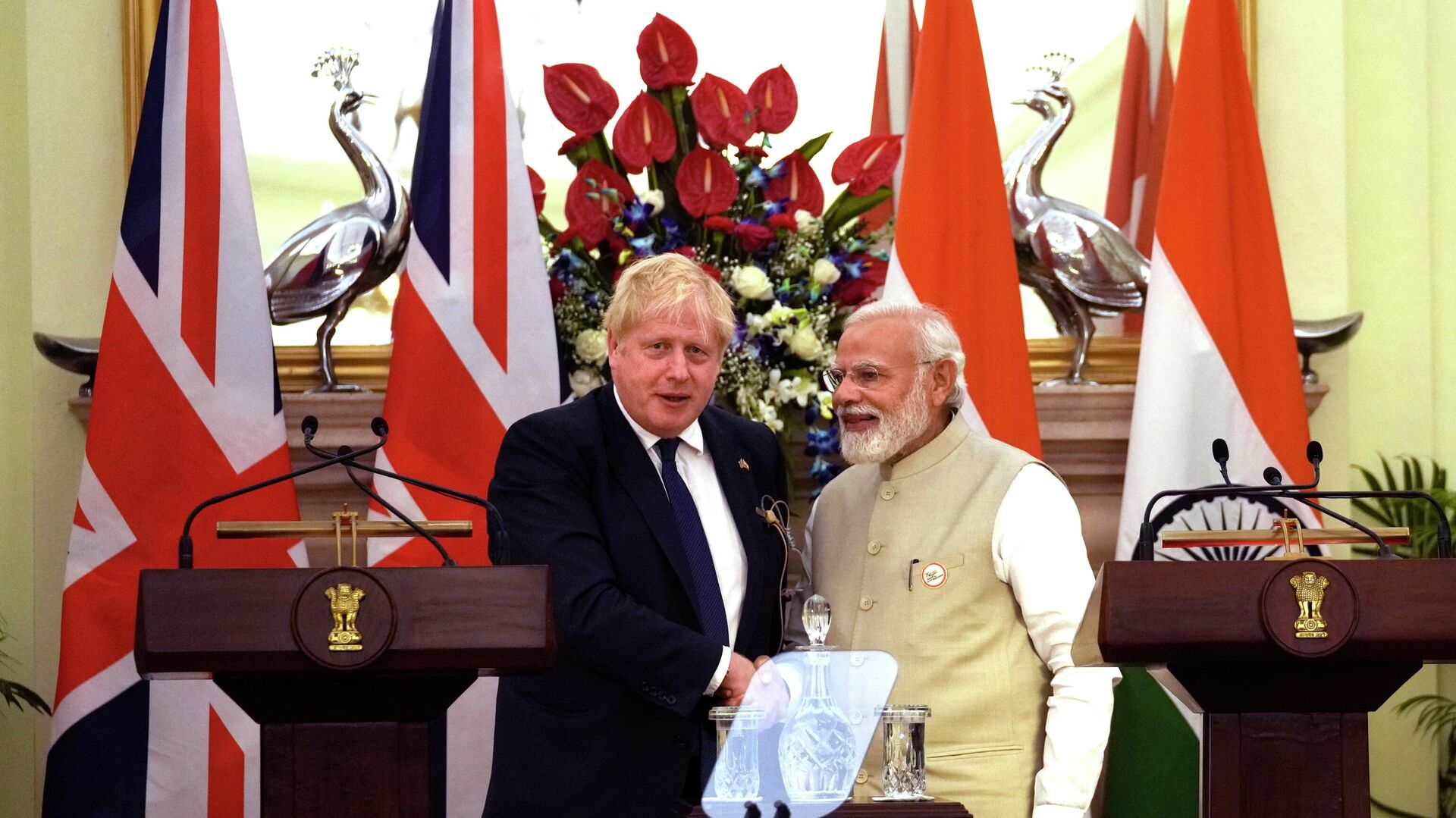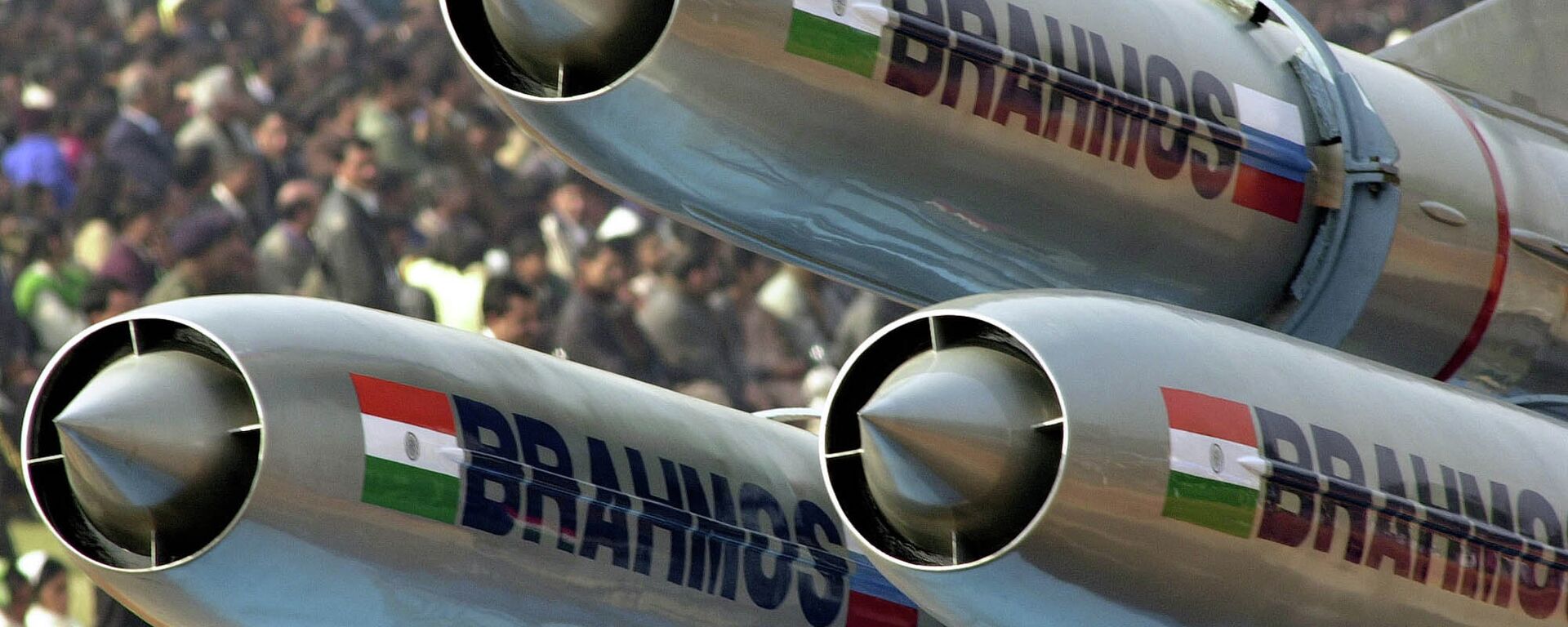https://sputnikglobe.com/20220423/as-india-refuses-to-budge-uk-shifts-focus-from-ukraine-to-indo-pacific-diplomacy-says-professor-1094991648.html
As India Refuses to Budge, UK Shifts Focus from Ukraine to Indo-Pacific Diplomacy, Says Professor
As India Refuses to Budge, UK Shifts Focus from Ukraine to Indo-Pacific Diplomacy, Says Professor
Sputnik International
UK Prime Minister Boris Johnson concluded his two-day visit to India on Friday, announcing increased defence co-operation with India. However, Johnson largely... 23.04.2022, Sputnik International
2022-04-23T19:15+0000
2022-04-23T19:15+0000
2023-05-28T15:19+0000
narendra modi
boris johnson
trade deal
defence
ukraine
russia
liz truss
indo-pacific
united kingdom (uk)
https://cdn1.img.sputnikglobe.com/img/07e6/04/16/1094974358_0:0:3078:1731_1920x0_80_0_0_0dbf218885c8917ce1ba3a40b8bb7d87.jpg
Describing India’s PM Narendra Modi as "Khaas Dost" or "special friend", Boris Johnson managed to avoid making a single remark during his visit to India to put relations between the two countries under pressure.India and the UK set a target of October 2022 to conclude their Free Trade Agreement. The two leaders noted co-operation in essential areas of strategic collaboration, including modern fighter aircraft and jet engine advanced core technology.The UK also announced an “open general export licence” to ease technology engagement with India and the open opportunity for Indian businesses to participate in the UK's aviation and naval ship-building programmes.Sputnik spoke with Gulshan Sachdeva, Jean Monnet Professor at Jawaharlal Nehru University’s Centre for European Studies, about Johnson's visit to New Delhi.Sputnik: Many believe Britain looks at India as a market rather than a partner. Do you think Johnson's visit was able to change this perception?Gulshan Sachdeva: India's big market is attractive to every major country, including the UK. India-UK goods and services trade is about $27 billion, which is in India's favour. So, India exports more goods and services than it imports from the UK.It is true that about 600 British companies operate in India, and they have invested more than $30 billion in the Indian market. But India is also the second-largest investor in the UK, and more than 800 Indian companies operate in Britain.So, this is a mutually beneficial partnership, and Prime Minister Boris Johnson, during his visit, tried to emphasise these points.Sputnik: In past years, the UK and India tried to intensify defence cooperation, but the results have been modest. Do you think the new roadmap may be a new beginning in defence relationships?Gulshan Sachdeva: It is true that the UK-India defence ties have been very modest in the past 20 years. For good defence partnerships, countries also need to have convergence in their strategic priorities.Because of closer ties between India and the US, and the UK's tilt towards the Indo-Pacific, India's strategic priorities are now somehow converging with the UK. This may lead to closer defence cooperation as well. So far, they have collaborated in maritime security, cyber security, and counter-terrorism.New Delhi and London struck a deal for expanded defence and security cooperation "to meet threats across land, sea and air, space and cyber", British Prime Minister Boris Johnson announced on 22 April, during his visit to India. That coincided with the South Asian state's 75th anniversary of independence from British colonial rule.Now, both nations have agreed to collaborate on maritime electric propulsion systems, and fighter aircraft and Jet engine technology. To ease technology engagement and take part in the Make in India programme, the UK has also announced an “open general export licence” facility for India. If appropriately implemented, many of these initiatives may lead to a new defence relationship with the UK.Sputnik: British diplomacy is somehow dictated by the political weight of British Pakistanis compared with that of British Indians. Because of this, many promises - such as support for UNSC membership or NSG - remain doubtful. Can we expect the UK government to translate its words into actions after this visit?Gulshan Sachdeva: The UK has always tried to balance its relations with India and Pakistan. Its sympathetic attitude towards Pakistan has been a problem for India in the past. If India and the UK are able to sign a trade deal within this year, the UK is likely to become more favourable towards India. The Indian membership in the UNSC is, anyway, a long-term project.Sputnik: Boris Johnson promised a lot, in defence and other sectors. Do you see a significant shift in the UK's approach towards India and what are the reasons for this?Gulshan Sachdeva: It is becoming clear that Britain's post-Brexit ambitions are somehow coinciding more with Indian economic and strategic priorities. As India has become closer to the US and the European Union, it is easy for the UK to work with India on the trade, investment, defence and technology sectors.Sputnik: Johnson is remaining more or less tight-lipped over India's stance on the Ukrainian issue. What does this indicate?Gulshan Sachdeva: This indicates that London has realised that New Delhi is not going to change its neutral position on the Ukrainian issue under any pressure from the West.Earlier, the British Foreign Secretary, Liz Truss, was in New Delhi as part of the "British diplomatic push on Ukraine”.After realising that it was not working, the Prime Minister was in India as part of the "UK's Indo-Pacific tilt". He was more focused on pushing for an early trade deal rather than focusing on other geopolitical issues.Sputnik: Boris Johnson faces immense pressure from his political opponents in Britain. Will his political position outweigh the promise made during his India trip?Gulshan Sachdeva: Convergence of economic and strategic issues between the UK and India are less likely to be affected by domestic political developments in either country.
https://sputnikglobe.com/20220422/why-india-wont-refuse-russian-arms-supplies-despite-uks-sweet-defence-deal-us-threats-1094977390.html
ukraine
indo-pacific
united kingdom (uk)
Sputnik International
feedback@sputniknews.com
+74956456601
MIA „Rossiya Segodnya“
2022
Rishikesh Kumar
https://cdn1.img.sputnikglobe.com/img/07e4/08/04/1080055820_0:0:388:389_100x100_80_0_0_40018ee210946d65d49ffba4f4c008e1.jpg
Rishikesh Kumar
https://cdn1.img.sputnikglobe.com/img/07e4/08/04/1080055820_0:0:388:389_100x100_80_0_0_40018ee210946d65d49ffba4f4c008e1.jpg
News
en_EN
Sputnik International
feedback@sputniknews.com
+74956456601
MIA „Rossiya Segodnya“
Sputnik International
feedback@sputniknews.com
+74956456601
MIA „Rossiya Segodnya“
Rishikesh Kumar
https://cdn1.img.sputnikglobe.com/img/07e4/08/04/1080055820_0:0:388:389_100x100_80_0_0_40018ee210946d65d49ffba4f4c008e1.jpg
narendra modi, boris johnson, trade deal, defence, ukraine, liz truss, indo-pacific, united kingdom (uk)
narendra modi, boris johnson, trade deal, defence, ukraine, liz truss, indo-pacific, united kingdom (uk)
As India Refuses to Budge, UK Shifts Focus from Ukraine to Indo-Pacific Diplomacy, Says Professor
19:15 GMT 23.04.2022 (Updated: 15:19 GMT 28.05.2023) UK Prime Minister Boris Johnson concluded his two-day visit to India on Friday, announcing increased defence co-operation with India. However, Johnson largely kept clear of vexed issues such as Ukraine and India's alleged human rights records during wide-ranging talks with his Indian counterpart Narendra Modi.
Describing India’s PM Narendra Modi as "Khaas Dost" or "special friend", Boris Johnson managed to avoid making a single remark during his visit to India to put relations between the two countries under pressure.
India and the UK set a target of October 2022 to conclude their Free Trade Agreement. The two leaders noted co-operation in essential areas of strategic collaboration, including modern fighter aircraft and jet engine advanced core technology.
The UK also announced an “open general export licence” to ease technology engagement with India and the open opportunity for Indian businesses to participate in the UK's aviation and naval ship-building programmes.
Sputnik spoke with Gulshan Sachdeva, Jean Monnet Professor at Jawaharlal Nehru University’s Centre for European Studies, about Johnson's visit to New Delhi.
Sputnik: Many believe Britain looks at India as a market rather than a partner. Do you think Johnson's visit was able to change this perception?
Gulshan Sachdeva: India's big market is attractive to every major country, including the UK. India-UK goods and services trade is about $27 billion, which is in India's favour. So, India exports more goods and services than it imports from the UK.
It is true that about 600 British companies operate in India, and they have invested more than $30 billion in the Indian market. But India is also the second-largest investor in the UK, and more than 800 Indian companies operate in Britain.
So, this is a mutually beneficial partnership, and Prime Minister Boris Johnson, during his visit, tried to emphasise these points.
Sputnik: In past years, the UK and India tried to intensify defence cooperation, but the results have been modest. Do you think the new roadmap may be a new beginning in defence relationships?
Gulshan Sachdeva: It is true that the UK-India defence ties have been very modest in the past 20 years. For good defence partnerships, countries also need to have convergence in their strategic priorities.
Because of closer ties between India and the US, and the UK's tilt towards the Indo-Pacific, India's strategic priorities are now somehow converging with the UK. This may lead to closer defence cooperation as well. So far, they have collaborated in maritime security, cyber security, and counter-terrorism.
New Delhi and London struck a deal for expanded defence and security cooperation "to meet threats across land, sea and air, space and cyber", British Prime Minister Boris Johnson announced on 22 April, during his visit to India. That coincided with the South Asian state's 75th anniversary of independence from British colonial rule.
Now, both nations have agreed to collaborate on maritime electric propulsion systems, and fighter aircraft and Jet engine technology. To ease technology engagement and take part in the Make in India programme, the UK has also announced an “open general export licence” facility for India. If appropriately implemented, many of these initiatives may lead to a new defence relationship with the UK.
Sputnik: British diplomacy is somehow dictated by the political weight of British Pakistanis compared with that of British Indians. Because of this, many promises - such as support for UNSC membership or NSG - remain doubtful. Can we expect the UK government to translate its words into actions after this visit?
Gulshan Sachdeva: The UK has always tried to balance its relations with India and Pakistan. Its sympathetic attitude towards Pakistan has been a problem for India in the past. If India and the UK are able to sign a trade deal within this year, the UK is likely to become more favourable towards India. The Indian membership in the UNSC is, anyway, a long-term project.
Sputnik: Boris Johnson promised a lot, in defence and other sectors. Do you see a significant shift in the UK's approach towards India and what are the reasons for this?
Gulshan Sachdeva: It is becoming clear that Britain's post-Brexit ambitions are somehow coinciding more with Indian economic and strategic priorities. As India has become closer to the US and the European Union, it is easy for the UK to work with India on the trade, investment, defence and technology sectors.
Sputnik: Johnson is remaining more or less tight-lipped over India's stance on the Ukrainian issue. What does this indicate?
Gulshan Sachdeva: This indicates that London has realised that New Delhi is not going to change its neutral position on the Ukrainian issue under any pressure from the West.
Earlier, the British Foreign Secretary, Liz Truss, was in New Delhi as part of the "British diplomatic push on Ukraine”.
After realising that it was not working, the Prime Minister was in India as part of the "UK's Indo-Pacific tilt". He was more focused on pushing for an early trade deal rather than focusing on other geopolitical issues.
Sputnik: Boris Johnson faces immense pressure from his political opponents in Britain. Will his political position outweigh the promise made during his India trip?
Gulshan Sachdeva: Convergence of economic and strategic issues between the UK and India are less likely to be affected by domestic political developments in either country.




